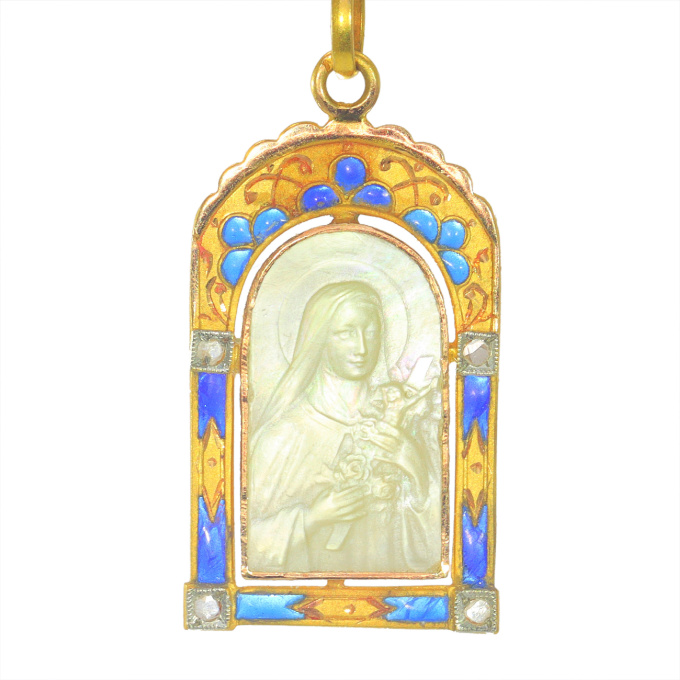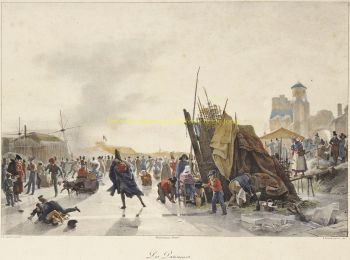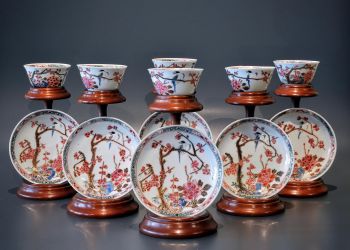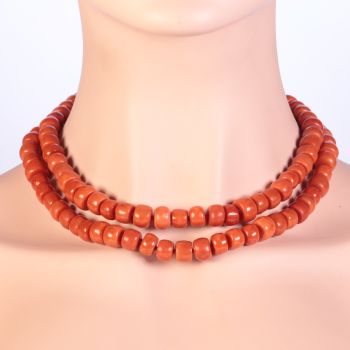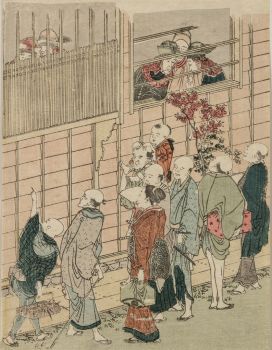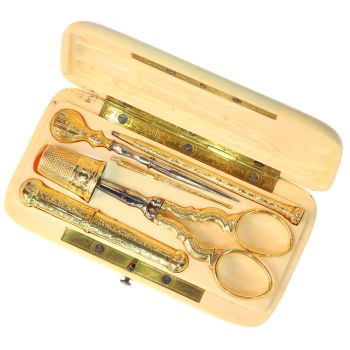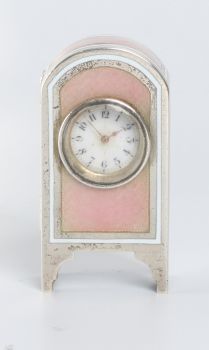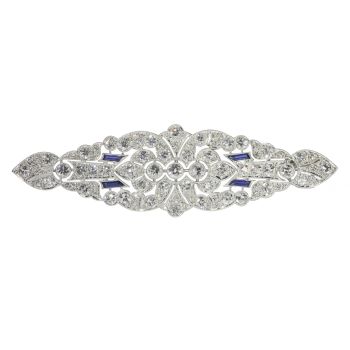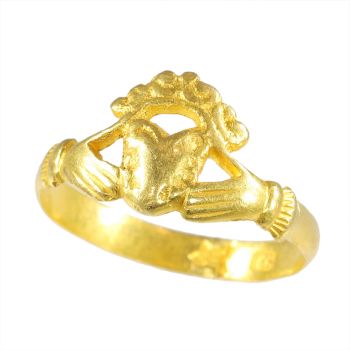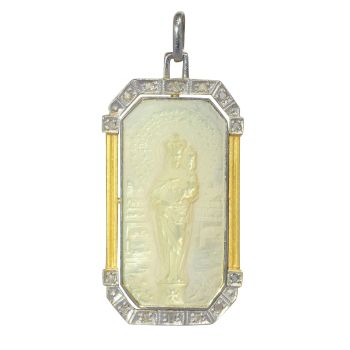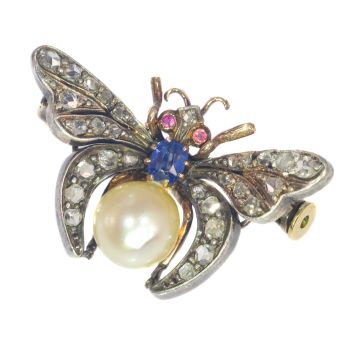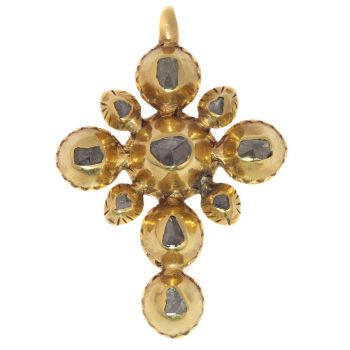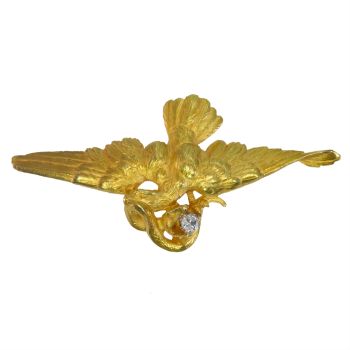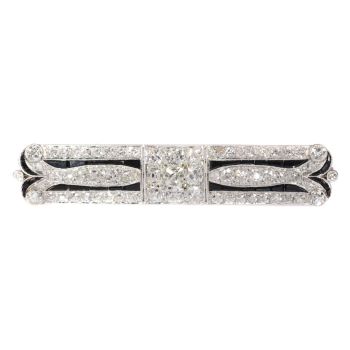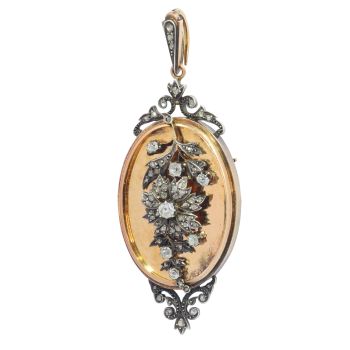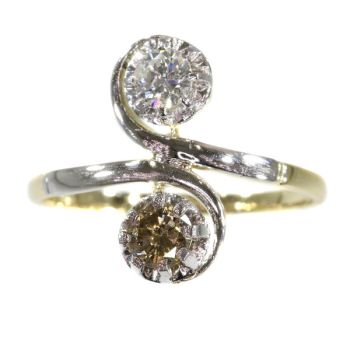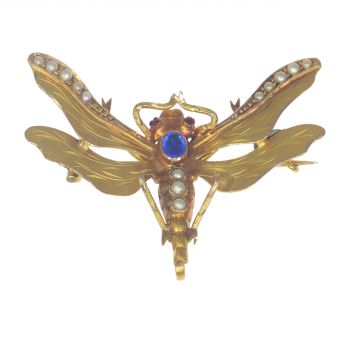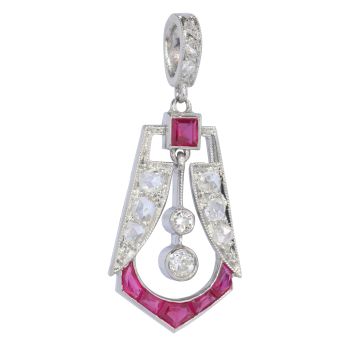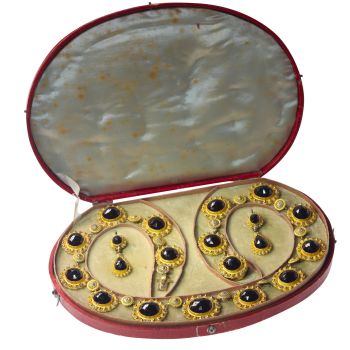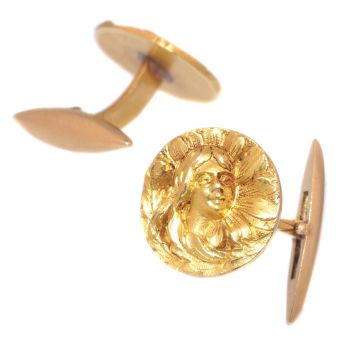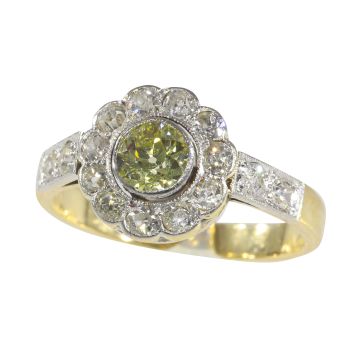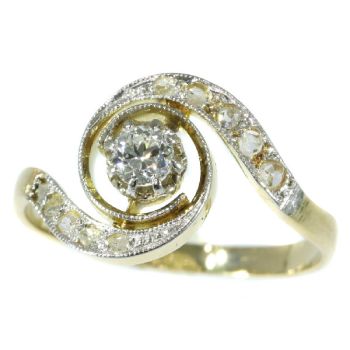Vintage antique 18K gold mother-of-pearl medal Mother Mary with the miracle of the roses - set with 1910
Unbekannter Künstler
€ 825
Adin Fine Antique Jewellery
- Über Kunstwerk
Antique jewelry object group
pendant
Condition
very good condition
more info on our condition scale
Country of origin
unknown
Style
something between the Late-Victorian and Belle Epoque style - Victorian decorative arts refers to the style of decorative arts during the Victorian era. The Victorian era is known for its eclectic revival and interpretation of historic styles and the introduction of cross-cultural influences from the middle east and Asia in furniture, fittings, and Interior decoration.
Victorian design is widely viewed as having indulged in a regrettable excess of ornament.
And the Belle Époque style (Belle Époque is French for "Beautiful Era") was a period in European social history that began during the late 19th century and lasted until World War I. Occurring during the time of the French Third Republic and the German Empire, the "Belle Époque" was named in retrospect, when it began to be considered a "golden age" the major powers of Europe, new technologies improved lives and the commercial arts adapted Renaissance and eighteenth-century styles to modern forms. In the newly rich United States, emerging from the Panic of 1873, the comparable epoch was dubbed the Gilded Age. In the United Kingdom, this epoch overlaps the end of what is called the Victorian Era there and the period named the Edwardian Era.
See also: late-Victorian
more info on styles
Style specifics
The Late or Aesthetic Victorian Period - Experts divide the reign of Queen Victoria, also called The Victorian era (1837-1901) into three periods of about twenty years each; The Romantic Victorian Period (1837 - 1860), The Grand Victorian Period (1860 - 1880), and the Late or Aesthetic Victorian Period (1880 - 1901).
We consider this to be of The Late or Aesthetic Victorian Period.
Jewelry of this period is changing back from heavy to more smaller, romantic pieces with often whimsical motifs. Jewelers using diamonds and bright gemstones in elaborated and fine feminine pieces.
Period
ca. 1910
Events & facts of this era, poetry of this era, fashion of this era.
Source of inspiration
Christianity
Theme
Mother Mary and the Miracle of the Roses
Material
18K yellow gold (touchstone tested)
more info on precious metals
Technique
Plique a jour which is a French term for a technique of decoration in enamelling by which the design is outlined in metal and filled in with one or variously colored transparent enamels but with no backing behind the enamel, so that the effect is similar to that of a stained-glass window. This effect is clearly visible at one of the pictures we took with lighting from the back.
Extra information
The Rose the ultimate symbol of love which has many prophecies, legends and fairy tales made about it.
A rose that blooms in autumn can mean a marriage. And you must remember the fairy tale of Sleeping Beauty. The bad queen pricked the beautiful, young princess with a thorn from a rose. She slept 100 years and a beautiful, young prince woke her up with a kiss. They married and they lived happily ever after. There exists a legend about how the rose got her thorns. The rose grew originally in the Garden of Eden and had no thorns. After the fall the rose got her thorns to remind people of their sin. Her beauty might been kept as memory of Paradise.
In the antiquity Eros, the Greek God of Love, was represented as a fresh and rosy (color of roses), lively and cheerful boy with goldish hair (like the stamens). The arrows were like the thorns and his wings were like the petals of the rose. In beauty, shape and scent, the rose is outstanding and hence has become the most commonly used floral symbol in the West. Roses have symbolical meanings in classic and Christian art. For example Venus was associated with roses, symbolizing love and beauty, whereas Virgin Mary sometimes was called a « rose without thorns » because of her purity.
Diamonds
Four senailles. A senaille is a simplified rose cut diamond, a small diamond chip with perhaps a few polished facets. We do not have the weight of these diamonds which is normal in our trade when it comes to senailles.
All diamonds we offer are screened by the I.J.G.C. for whether they are natural or synthetic, and all diamonds in this jewel are 100% guaranteed to be natural.
Precious stones
One plate of mother-of-pearl
Birthstones
Diamond is the birthstone (or month stone) for April.
more info on birthstones
Hallmarks
Illegible remains.
more info on hallmarks
Dimensions
2,66 cm (1,05 inch) x 1,25 cm (0,49 inch)
see picture with a ruler in millimeters and inches
Weight
1,30 gram (0,84 dwt)
Adin Reference Nº
23191-0417
Copyright photography
Adin, fine antique jewellery
Additional information
our latest acquisitions
jewelry glossary
wall of fame
visit us in Antwerp
subscribe to our mailinglist
- Über Künstler
Es kann vorkommen, dass ein Künstler oder Hersteller unbekannt ist.
Bei einigen Werken ist nicht zu bestimmen, von wem sie hergestellt wurden, oder sie wurden von (einer Gruppe von) Handwerkern hergestellt. Beispiele sind Statuen aus der Antike, Möbel, Spiegel oder Signaturen, die nicht klar oder lesbar sind, aber auch einige Werke sind überhaupt nicht signiert.
Außerdem finden Sie folgende Beschreibung:
•"Zugeschrieben …." Ihrer Meinung nach wohl zumindest teilweise ein Werk des Künstlers
•„Atelier von ….“ oder „Werkstatt von“ Ihrer Meinung nach eine Arbeit, die im Atelier oder in der Werkstatt des Künstlers, möglicherweise unter seiner Aufsicht, ausgeführt wurde
•„Kreis von ….“ Ihrer Meinung nach ein Werk aus der Zeit des Künstlers, das seinen Einfluss zeigt, eng mit dem Künstler verbunden, aber nicht unbedingt sein Schüler
•"Art von …." oder „Anhänger von ….“ Ihrer Meinung nach eine Arbeit, die im Stil des Künstlers ausgeführt wurde, aber nicht unbedingt von einem Schüler; kann zeitgenössisch oder fast zeitgenössisch sein
•„Art von ….“ Ihrer Meinung nach ein Werk im Stil des Künstlers, aber späteren Datums
•"Nach …." Ihrer Meinung nach eine Kopie (jegliches Datums) eines Werks des Künstlers
• „Unterzeichnet …“, „Datiert …“. oder „Beschriftet“ Ihrer Meinung nach wurde das Werk vom Künstler signiert/datiert/beschriftet. Das Hinzufügen eines Fragezeichens weist auf einen Zweifel hin
• „Mit Unterschrift …“, „Mit Datum …“, „Mit Aufschrift ….“ oder „Trägt Unterschrift/Datum/Beschriftung“ ihrer Meinung nach die Unterschrift/Datum/Beschriftung von jemand anderem als dem Künstler hinzugefügt wurde
Sind Sie daran interessiert, dieses Kunstwerk zu kaufen?
Related artworks
Unbekannter Künstler
Series of 6 Chinese cups and saucers (Yongzheng period)1722 - 1735
Preis auf AnfrageKuipers Kunst & Antiek
1 - 4 / 12- 1 - 4 / 12

